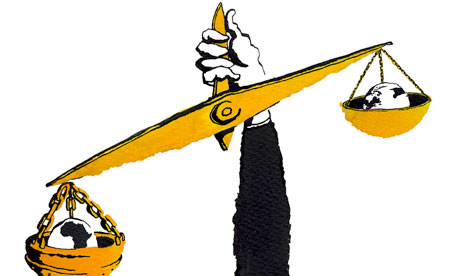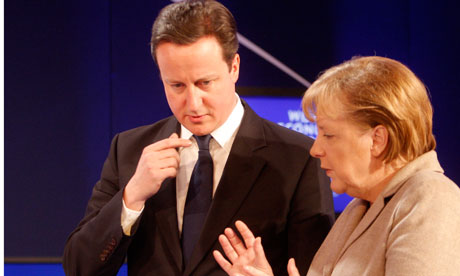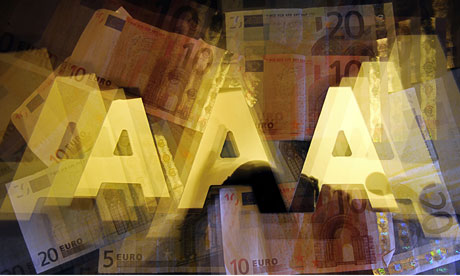The facts are clear. This cruel austerity experiment has failed
While the human cost of economic stupidity is all too visible, the world's leaders are paralysed by their dogma

A woman receives a free meal from a soup
kitchen organised by a Greek humanitarian group in Athens’ main Syntagma
Square. Photograph: Kostas Tsironis/AP
Last week was an awesome warning of where go-it-alone austerity
can lead. It produced some brutal evidence of where we end up when we
place finance above economy and society. The markets are now betting not
just on the break-up of the euro but on the arrival of a new economic
dark age. The world economy is edging nearer to the abyss, and
policymakers, none more than in Britain, are paralysed by the
stupidities of their home-spun economics. Yanis Varoufakis,
ex-speechwriter for former Greek prime minister George Papandreou and
now an economics professor in the US, said last week: "There is
precisely zero chance of austerity working. It is the same as thinking
you can escape from gravity by waving your arms up and down."
It could hardly be more sobering. Money has flooded out of Spain, Greece and the peripheral European economies. Signs of the crisis range from Athen's soup kitchens to Spain's crowds of indignados protesting in the streets against austerity and a broken capitalism. Youth unemployment is sky-high. Less visible is the avalanche of money flowing into hoped-for safe havens in the US, Germany and even Britain. The last time the British government could sell government bonds at interest rates as low as today's was in the early 1700s.
George Osborne and his acolytes proclaim this as a triumph of the government's economic policies. They are gravely mistaken. Rather it portends fears that the international economic order may collapse because if so many countries are simultaneously pursuing austerity, where's growth to come from?
Virtually everywhere you look there are signs of a weakening world economy. At home, manufacturing suffered its biggest plunge for three years, and this in an economy already suffering its longest depression since the 19th century. American jobs growth is petering out. Unemployment in Europe averages 11%. Even China witnessed a sharp fall away in factory activity in May.
Yet none of this should be a surprise. We live in the aftermath of one of the biggest financial and intellectual mistakes ever made. For a generation the world, with the London/New York financial axis at its heart, surrendered to the specious theory that lending and financial contracts could grow many times faster than the underlying economy. There was a blind belief that in a free market banks could not make mistakes. Free markets didn't make mistakes – only clumsy bureaucratic states made economic mistakes. Or so they said. Financial alchemists, guided by the maxims of free market fundamentalism, could make no such errors.
Except that they did. The result was the financial crisis of 2008. Had governments not underwritten their overstretched banks with trillions of dollars, euros and pounds, an even worse global slump would have ensued. But while the banks could continue trading, the hundreds of trillions of loans and financial contracts they had made did not go away.
And because governments had guaranteed their deposits, as in Ireland, or had to inject capital into them as Spain has been doing all last week, this private bank debt has steadily become public debt. Here is a classic case where all the gains were privatised, and all the losses were socialised. It was the much-maligned state that had to step in and clear up the mess left behind by the private sector. The free market wasn't so free after all – in fact it proved astonishingly expensive for the public purse. People across Europe still pay the price.
This is no solution. Overstretched banks have become more cautious about lending new cash; and even strong banks are caught up in the backwash because if they step into the breach they could fall into a vortex of falling property prices and declining economic activity, becoming weak in turn. So as banks stand aside from their crucial function of generating credit, governments and central banks must step in to generate the demand that has now disappeared.
But they have not done so to a sufficient degree. Part of the problem is that the more bank debt that governments guarantee, the less room for manoeuvre they feel they have – especially as their stagnating economies forces up welfare spending and depresses tax revenues.
This is not just an economic but a moral necessity, they argue. Living within one's means rather than "maxing" out on debt appeals to American, British and German individualistic Protestantism. Inflation is even more a sign of moral degradation: it means reneging on promises, rewarding spendthrifts and penalising savers. We had the good years. Now we must take our medicine. The public and private sectors must retrench simultaneously worldwide. Enterprise and free markets will do the rest. The "march of the makers" will step in to fill the void left by public austerity measures.
This is a first-order moral and economic mistake. Human beings need each other for mutual support. In economic terms this means that no individual, either as a person or a company, can manage existential risk by themselves. That risk needs to be shared and mitigated otherwise the risk is not accepted. There would be no enterprise or innovation – the risks of failure too great. That is why there is a role for both private and public sectors. It is governments who provide the means through which we express our social obligations and pool our risks.
This is the heart of Keynesian economics – a different set of moral and economic propositions than those which prevail. Today we can see an almost laboratory experiment on a global scale of why Keynes was right and his detractors wrong. There is no doubt what Keynes would advocate now: a government-sponsored increase in demand co-ordinated across as many countries as possible and an acceptance of a temporary but closely managed increase in inflation to reduce the real value of debt.
The enormous legacy of private debt – whether in Britain, Germany, Spain, the US or Greece – and the fiendishly complicated way so many of the loans have been organised and distributed around the world financial system cannot be easily unwound. Sir Philip Hampton, chair of RBS, warned this week it might take a generation for RBS investors to recover their money.
The choice is thus stark. To commit to decades of economic stagnation, the break-up of the eurozone, the risk of trade protection and autarchic economic policies, the dismantling of the west's social contracts, the imposition of high unemployment and the political fallout that will follow.
Or to change course.
The technical means are relatively simple. Governments must replace targets for inflation with targets for the growth of prices and growth of output combined. Central banks should inject money into their financial systems by offering to buy new bank loans made to support new investment, new innovation or new infrastructure – helped by partial government guarantees.
Governments also need to increase demand. They can do this directly – with targeted and time-limited tax cuts or spending increases. They can also move indirectly, taxing the rich more aggressively and re-allocating the proceeds in tax cuts to those on middle incomes and lower who tend to spend more – along the lines that both presidents Obama and Hollande have proposed. There is also a case for a financial transactions tax – both to raise crucial revenue and to cap the growth and frenetic speed of financial transactions. Finance has become too powerful. It needs constraining.
Will any of this happen? The west is at a cross-roads, and although such proposals will be fiercely opposed by the British, German and American right they need to be beaten back. After all, it is their ideas that have brought us to this pass. It is not too fanciful to argue that the future of western capitalism depends upon how this argument plays out – and how quickly, if at all, there is a change of course.
It could hardly be more sobering. Money has flooded out of Spain, Greece and the peripheral European economies. Signs of the crisis range from Athen's soup kitchens to Spain's crowds of indignados protesting in the streets against austerity and a broken capitalism. Youth unemployment is sky-high. Less visible is the avalanche of money flowing into hoped-for safe havens in the US, Germany and even Britain. The last time the British government could sell government bonds at interest rates as low as today's was in the early 1700s.
George Osborne and his acolytes proclaim this as a triumph of the government's economic policies. They are gravely mistaken. Rather it portends fears that the international economic order may collapse because if so many countries are simultaneously pursuing austerity, where's growth to come from?
Virtually everywhere you look there are signs of a weakening world economy. At home, manufacturing suffered its biggest plunge for three years, and this in an economy already suffering its longest depression since the 19th century. American jobs growth is petering out. Unemployment in Europe averages 11%. Even China witnessed a sharp fall away in factory activity in May.
Yet none of this should be a surprise. We live in the aftermath of one of the biggest financial and intellectual mistakes ever made. For a generation the world, with the London/New York financial axis at its heart, surrendered to the specious theory that lending and financial contracts could grow many times faster than the underlying economy. There was a blind belief that in a free market banks could not make mistakes. Free markets didn't make mistakes – only clumsy bureaucratic states made economic mistakes. Or so they said. Financial alchemists, guided by the maxims of free market fundamentalism, could make no such errors.
Except that they did. The result was the financial crisis of 2008. Had governments not underwritten their overstretched banks with trillions of dollars, euros and pounds, an even worse global slump would have ensued. But while the banks could continue trading, the hundreds of trillions of loans and financial contracts they had made did not go away.
And because governments had guaranteed their deposits, as in Ireland, or had to inject capital into them as Spain has been doing all last week, this private bank debt has steadily become public debt. Here is a classic case where all the gains were privatised, and all the losses were socialised. It was the much-maligned state that had to step in and clear up the mess left behind by the private sector. The free market wasn't so free after all – in fact it proved astonishingly expensive for the public purse. People across Europe still pay the price.
This is no solution. Overstretched banks have become more cautious about lending new cash; and even strong banks are caught up in the backwash because if they step into the breach they could fall into a vortex of falling property prices and declining economic activity, becoming weak in turn. So as banks stand aside from their crucial function of generating credit, governments and central banks must step in to generate the demand that has now disappeared.
But they have not done so to a sufficient degree. Part of the problem is that the more bank debt that governments guarantee, the less room for manoeuvre they feel they have – especially as their stagnating economies forces up welfare spending and depresses tax revenues.
But the larger problem is intellectual.
The dominant ideology of the day – from the same roots that delivered
the crisis – forbids it. A consensus stretching from US Republicans
through to Angela Merkel's Christian Democrats via George Osborne's
Treasury continues to claim that the state is the source of economic
bad. The state threatens enterprise, invites damaging taxation, and is
the root cause of spreading inflation. The state must balance the books
just as the private sector must.
This is not just an economic but a moral necessity, they argue. Living within one's means rather than "maxing" out on debt appeals to American, British and German individualistic Protestantism. Inflation is even more a sign of moral degradation: it means reneging on promises, rewarding spendthrifts and penalising savers. We had the good years. Now we must take our medicine. The public and private sectors must retrench simultaneously worldwide. Enterprise and free markets will do the rest. The "march of the makers" will step in to fill the void left by public austerity measures.
This is a first-order moral and economic mistake. Human beings need each other for mutual support. In economic terms this means that no individual, either as a person or a company, can manage existential risk by themselves. That risk needs to be shared and mitigated otherwise the risk is not accepted. There would be no enterprise or innovation – the risks of failure too great. That is why there is a role for both private and public sectors. It is governments who provide the means through which we express our social obligations and pool our risks.
This is the heart of Keynesian economics – a different set of moral and economic propositions than those which prevail. Today we can see an almost laboratory experiment on a global scale of why Keynes was right and his detractors wrong. There is no doubt what Keynes would advocate now: a government-sponsored increase in demand co-ordinated across as many countries as possible and an acceptance of a temporary but closely managed increase in inflation to reduce the real value of debt.
The enormous legacy of private debt – whether in Britain, Germany, Spain, the US or Greece – and the fiendishly complicated way so many of the loans have been organised and distributed around the world financial system cannot be easily unwound. Sir Philip Hampton, chair of RBS, warned this week it might take a generation for RBS investors to recover their money.
The choice is thus stark. To commit to decades of economic stagnation, the break-up of the eurozone, the risk of trade protection and autarchic economic policies, the dismantling of the west's social contracts, the imposition of high unemployment and the political fallout that will follow.
Or to change course.
The technical means are relatively simple. Governments must replace targets for inflation with targets for the growth of prices and growth of output combined. Central banks should inject money into their financial systems by offering to buy new bank loans made to support new investment, new innovation or new infrastructure – helped by partial government guarantees.
Governments also need to increase demand. They can do this directly – with targeted and time-limited tax cuts or spending increases. They can also move indirectly, taxing the rich more aggressively and re-allocating the proceeds in tax cuts to those on middle incomes and lower who tend to spend more – along the lines that both presidents Obama and Hollande have proposed. There is also a case for a financial transactions tax – both to raise crucial revenue and to cap the growth and frenetic speed of financial transactions. Finance has become too powerful. It needs constraining.
Will any of this happen? The west is at a cross-roads, and although such proposals will be fiercely opposed by the British, German and American right they need to be beaten back. After all, it is their ideas that have brought us to this pass. It is not too fanciful to argue that the future of western capitalism depends upon how this argument plays out – and how quickly, if at all, there is a change of course.







 139 Comments
139 Comments
